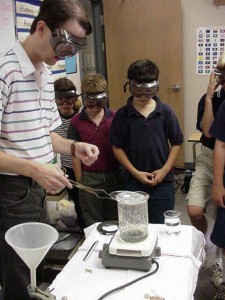
You’ve got to have sympathy for battling science teachers like Dawn Garbett, who writing in the Herald this week expressed her dismay at the state of science education at primary school level.
As the National Education Monitoring Project results have illustrated, we’ve got a problem with science education. Kids start out enthusiastic about the subject, but by year 8, interest in science is waning. The result at the other end of the education cycle is that less kids are deciding to take science degrees at university level. Garbett has her own theory for that trend:
“The science that children do get is predominantly group work, research and projects – not experiments, practical work, field trips and visits that they might have rightfully anticipated science was all about.”
In other words, kids aren’t getting hooked on science early, the fascination factor isn’t there. But New Zealand isn’t alone in struggling to attract its young people into the field of science. Across the ditch, the Australians are considering undertaking a revamp of the school curriculum which will see a big shake-up of how science is taught.
Aussie kids are also finding science a turn-off. Now under a draft proposal, traditional subjects like biology and chemistry will disappear from the Australian curriculum until the senior years of school. Instead, students may be taught a more general science curriculum that teaches “science for life”, whatever that is.
It sounds like some politically correct term for making science more accessible and agreeable. But the idea of teaching the big principles of science across the three disciplines does make some sense. As Professor Martin Westwell at Flinders University points out, all the really innovative stuff happens where the disciplines intersect.
That’s why Apple Computer has behavioural scientists as well as programmers and plastic moulding experts on its payroll and why think tank geekfests like O’Reilly’s Foo Camp can see a psychologist, a dotcom CEO and a professional chess player share a tent for the weekend.
But does the proposed Australian approach risk developing too general skills? Not according to Westwell and Professor Dennis Goodrum of Canberra University, the author of the draft science proposal. As he points out:
“Surely a lawyer should have a better understanding of scientific principles in a rich way, just as a medical doctor or a businessman or social worker,” he said.
“All these areas have a social scientific dimension which is important.”
My hazy memories of primary and early secondary school science lessons are filled with bunsen burners, smoking tungsten, feeding Mexican walking fish and science labs reeking of ammonia. I spent hours learning the periodic table of elements by heart and I still remember many of them, but I’d be buggered if I’ve ever had any practical use for such information. So the idea of kids learning about climate change, hybrid cars and stem cell research has some appeal.
Less rote learning and swatting infront of text books certainly gels with the changing way kids pick up information these days, but will it ultimately encourage more of them to carry on science through school and pursue the pure sciences at university? Who knows, it’s an experiment that may take a generation of school kids to play out. But on both sides of the Tasman one thing is clear – something has to be done to arrest the slide in participation in science education. The very health of our innovation sector is at stake.